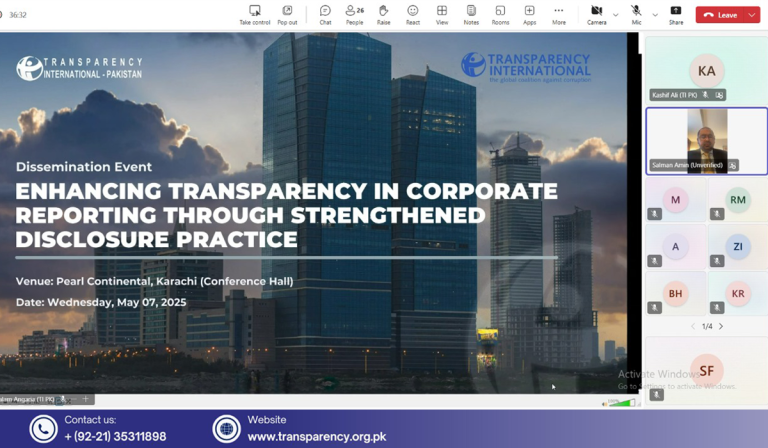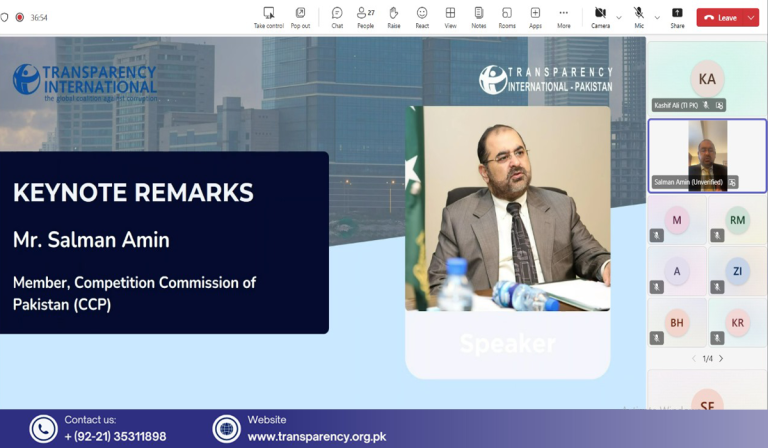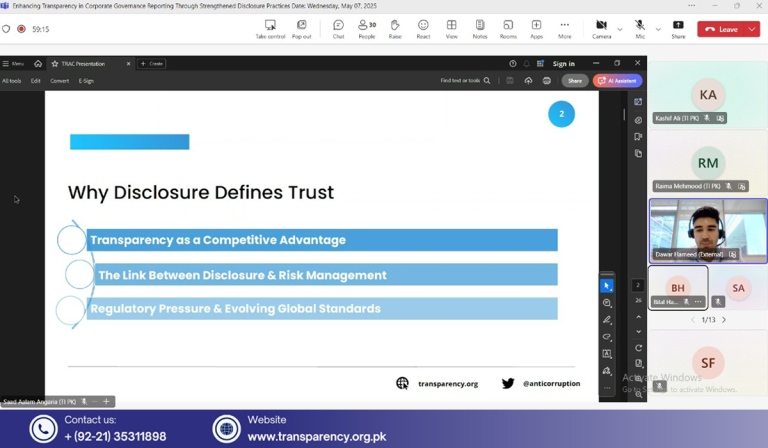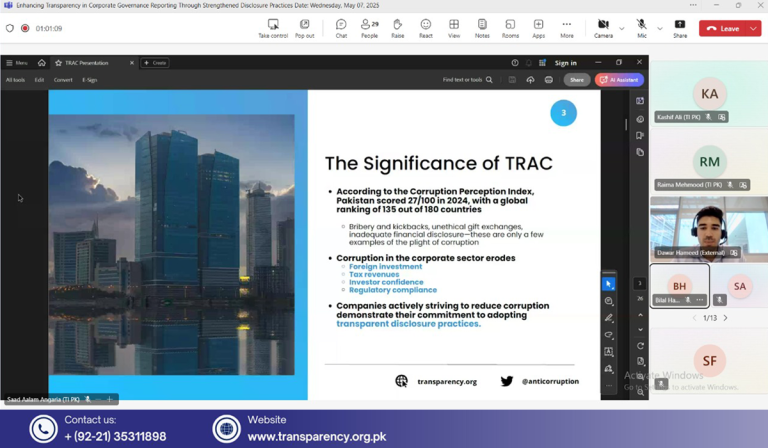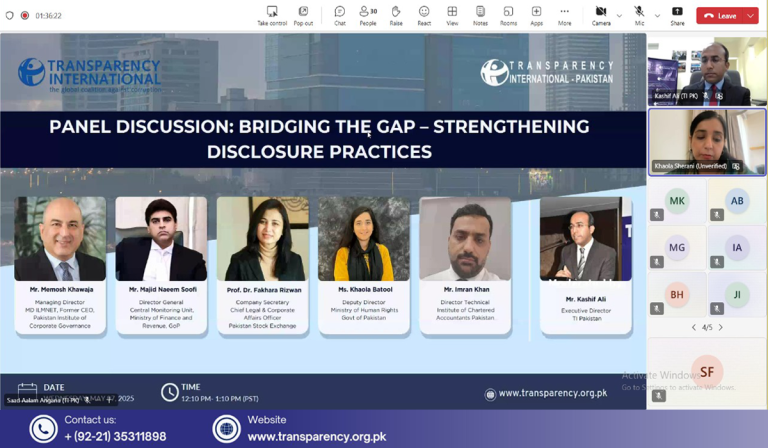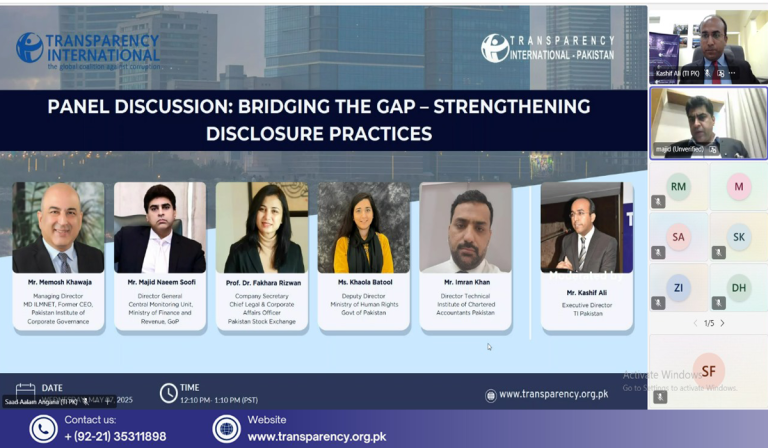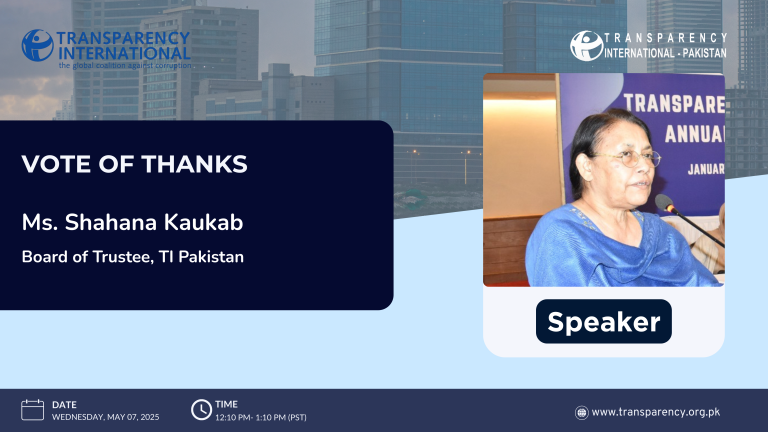Dissemination Event: Enhancing Transparency in Corporate Governance Reporting
Dissemination Event: Enhancing Transparency in Corporate Governance Reporting Through Strengthened Disclosure Practices
Date: Wednesday, May 7, 2025
Venue: Microsoft Teams (Online)
On May 7, 2025, Transparency International Pakistan hosted the virtual Dissemination Event on its recently launched report “Transparency in Corporate Reporting 2024: Assessment of Pakistan Top 69 Public Listed Companies”. Around 40 participants representing regulatory bodies, companies representatives and members of business chambers. Mr. Kashif Ali, Executive Director of TI Pakistan delivered opening remarks. He acknowledged the unforeseen shift to an online format due to pressing national security circumstances and expressed gratitude to attendees for their adaptability to join the event virtually. Mr. Ali formally introduced the TRAC report 2024, a detailed assessment of the public disclosure practices of the top 69 leading companies listed on the Pakistan Stock Exchange (PSX). He highlighted that the report is not an assessment of the integrity of companies but a data driven evaluation of transparency in public disclosures, particularly through annual reports, website and other online platforms.
Mr. Ali highlighted that the report reveals that the companies in Pakistan are moderately transparent with overall average compliance at 72.3%. He underlined that transparent reporting is foundational to ethical corporate governance and builds trust with investors, regulators, and the public. Emphasizing recent improvements in Pakistan’s regulatory environment, he cited the SECP’s updated corporate governance codes, the increasing institutionalization of ESG frameworks, and the integration of anti-harassment and diversity policies through the National Action Plan on Business and Human Rights. However, transparency, he stressed, must evolve beyond box ticking into a deep-rooted cultural transformation that embeds integrity within governance systems. He further emphasized that TI Pakistan, through its Business Integrity work is aiming to bridge these gaps by offering capacity building, dialogue forums, and knowledge sharing platforms designed to support businesses and regulators in adopting and upholding robust transparency standards.
Following Mr. Ali’s remarks, Mr. Salman Amin, Member of the Competition Commission of Pakistan (CCP), offered an incisive analysis of the role of transparency in promoting fair competition and robust corporate governance. He informed the participants that the CCP’s foundational mandate is grounded in the Competition Act, 2010, which focuses on four key enforcement areas: cartel prevention, abuse of market dominance, merger oversight, and conditional exemptions. He welcomed the 72.3% average transparency score reported by TRAC 2024 but argued that its important that this average score is increased to much higher in coming years. Transparency, he argued, must extend beyond investor interests to encompass broader market stakeholders including regulators, consumers, and the public.
He appreciated that though the financial reporting had a high score (94.35%), significant gaps persisted, especially in procurement disclosures (59%) and anti-corruption mechanisms (47.28%). These weaknesses, he warned, facilitate cartel behavior and lead to massive economic losses up to PKR 500 billion annually. Mr. Amin also critiqued how Corporate Social Responsibility (CSR) is often used as a branding tool rather than a genuine contribution to public welfare. He called for mandatory anti-corruption frameworks, sector specific transaction transparency, incentivized whistleblower programmes, procurement reforms, and third-party verification of disclosures. Commending high performing entities like Lucky Core Industries and highlighting underperformers such as Highnoon Laboratories and non-reporting firms like Pakgen Power, Mr. Amin urged a shift from compliance to seeing strategic benefit and value addition for enhanced disclosure practices.
The next speaker was Mr. Dawar Hameed Butt, Consultant Climate Finance Pakistan. He presented the core findings from the TRAC 2024 report and highlighted that enhanced reporting on transparency metrics provides a competitive advantage to the companies. He briefed the participants on the TRAC methodology and highlighted that for 2024 TRAC assessment, 69 companies were selected from 26 sectors based on market capitalization of 25 million as of September 25, 2024. He further highlighted that the companies were scored on each question based on “Full Disclosure”, “Partial Disclosure” and “Non-Disclosure”. The average of all applicable scores determined the final result. He informed the participants that each company was assessed on seven pillars: Anti-corruption programs, organizational transparency, Domestic financial reporting practices, Gender and non-discrimination policies, Human rights and corporate social responsibility (CSR), Procurement and country-by-country reporting. Furthermore, TRAC indicators were sourced from: SECP’s Code of Corporate Governance & ESG Guidelines, The National Action Plan on Business and Human Rights (2021-2026) & ICAP’s Code of Ethics and UNGC 10th Principle of Anti-Corruption, as well as global best practices. Each company was evaluated based on publicly available information Latest through annual reports (2024/2023), company websites and other relevant documents.
Mr. Dawar further highlighted that the results reveal 26/69 companies are Signifcantly Transparent; 30/69 companies were Moderately Transparent, 10/69 companies were Partially Transparent and 3/69 companies were Slightly Transparent. Furthermore, Chemical sector ranked highest at 94.3%, Paper, board & packaging ranked second at 90.7% and Fertilizer sector ranked third at 83%. He further emphasized that the purpose of the report was to serve as a tool for constructive dialogue and progress, offering actionable recommendations for companies to improve disclosure practices. These included the institutionalization of anti-corruption policies, comprehensive financial disclosures, gender inclusive hiring and promotion practices, improved procurement transparency, and alignment with both national and international human rights reporting standards. Enhancing corporate transparency, he argued, is critical not only for regulatory compliance but also for fostering investor confidence, accountability, and ultimately, driving integrity driven business environment in Pakistan.
After the presentation: Panel Discussion titled: “Bridging the Gap – Strengthening Disclosure Practices” brough stakeholders from regulatory bodies, corporate governance experts and representative of Oversee Investment Chamber. The panelists included:
- Memosh Khawaja – Managing Director, ILMNET; Former CEO, Pakistan Institute for Corporate Governance (PICG)
- Majid Naeem Soofi – Director General (DG) State Owned Entities (SOEs) Central Monitoring Unit (CMU), Ministry of Finance, Government of Pakistan
- Fakhara Rizwan – Chief of Legal and Corporate Affairs, Pakistan Stock Exchange Limite
- Khaola Batool Sherani – Deputy Director, Ministry of Human Rights, Government of Pakistan
- Muhammad Imran Khan – Director Technical, Institute of Corporate Accountants Pakistan (ICAP)
The panel discussion was moderated by Mr. Kashif Ali, Executive Director, TI Pakistan.
Mr. Memosh Khawaja, former CEO of the Pakistan Institute of Corporate Governance, traced Pakistan’s early regional leadership in corporate governance but noted structural impediments such as concentrated ownership and weak board independence. He emphasized that ESG integration must shift from compliance to value creation and strategic risk management.
Mr. Majid Naeem Soofi, DG SOEs, Central Monitoring Unit, Ministry of Finance highlighted that CMU has made everything extremely transparent through publication of regular reports on corporate risks and making those reports publicly available. The objective of CMU is to give maximum information about state owned entities (SOEs) to the general public. He highlighted that there is a need for improvement in our corporate governance ensuring independence and performance of the board. He further highlighted that the ESG standards and SECP guidelines are voluntary and CMU has recommended that climate related risks should be binding on the companies through mandatory reporting.
Ms. Khaola Batool Sherani, Deputy Director at the Ministry of Human Rights, elaborated on Pakistan’s National Action Plan on Business and Human Rights (2021-2026). She highlighted that the NAP is framed by the UN Guiding Principles and it reflects a transition from CSR to a rights-based governance model, supported by a due diligence roadmap that integrates human rights into procurement and environmental frameworks. She highlighted that the Action Plan requires (voluntary) businesses to practice human rights and due diligence and appreciated TI Pakistan report which provides crucial insights into the compliance.
Mr. Muhammad Imran Khan, Director Technical, Institute of Chartered Accountants of Pakistan discussed the technical landscape of financial reporting. While Pakistan maintains high compliance with IFRS, he acknowledged the need for broader governance disclosures. He share with the participants that the SECP has already adopted IFRS Sustainability Disclosure Standards. These standards require disclosure of information around Environmental, Social, and Governance (ESG) factors. These standards also lay down sector-specific disclosure metrics for entities belonging to various sectors. Their implementation in Pakistan would enhance and strengthen corporate transparency over coming years. At the same time, he emphasized there is a need to create incentives for Transparency. This can be achieved through award and recognition programs for companies demonstrating high transparency, Stock exchange incentives, such as reduced listing fees or special indices for transparent companies and Partnerships with banks and development finance institutions to offer preferential loan terms or credit ratings to companies with strong transparency metrics. Mr. Imran also emphasized that there is need to enhance corporate governance culture through developing mandatory trainings on transparency, compliance, and disclosure best practices for board members and senior management, as well as, promoting the role of independent directors in demanding and overseeing transparency metrics.
Followed by the panel discussion, open discussion and Q&A session took place. Participants representing various companies included in TRAC 2024 obtained clarity on the methodology and scoring. They also emphasized the ethical dimension of transparency, viewing it as a reflection of corporate values rather than just a compliance metric. In response, Mr. Kashif Ali clarified that the framework is anchored in domestic regulations but aspires to encourage best practices. Voluntary disclosures, it was emphasized, are vital for building trust and fostering ethical business cultures.
The session was closed with a vote of thanks extended by Ms. Shahana Kaukab, Board of Trustee, TI Pakistan. She expressed her Gratitude to the speakers, panelists, corporate representatives, and attendees for their valuable contributions. The concluding message emphasized that the event is part of a larger journey towards stronger corporate governance in Pakistan.

